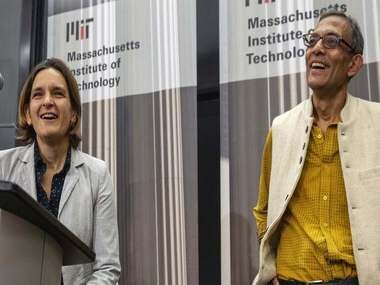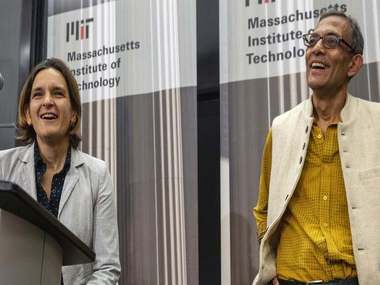Abhijit Banerjee, the Indian-American economist and Massachusetts Institute of Technology (MIT) professor, who won the 2019 Nobel Economics Prize along with wife Esther Duflo and Michael Kremer for their work in alleviating global poverty, has kept a close watch on developments in the Indian economy. Banerjee has been quite vocal about the serious state the Indian economy is facing currently. In his comments to Raghuram Rajan’s O P Jindal lecture on the economy of India, Banerjee said the growth of the economy has slowed massively, investment has collapsed and public borrowing (if properly added up) is 9-10 percent of the GDP. Quoting National Sample Survey (NSS) data, Banerjee said average consumption expenditure at current prices fell from Rs 1,587 per person per month (ppm) in 2014 to Rs1,524 ppm in 2017-18 in rural areas while in urban areas it fell from Rs 2926 ppm in 2014 to Rs 2909 ppm in 2018. Banerjee has been largely unhappy about the Narendra Modi government’s policy responses to the economic slowdown suggesting that both the Goods and Services Tax (GST) and demonetisation contrtibuted to the current state of the economy and institutional weakness didn’t augur well for the economy. Along with these factors, private investments collapsing and exports shrinking have been cited as worrying signs. He also observed that overexpansion of the real estate sector is the harbinger of the crisis in the non-banking finance companies and banks. A big demand deficit in the low income groups added to slowdown woes. [caption id=“attachment_7499691” align=“alignleft” width=“380”]  Esther Duflo, left, and Abhijit Banerjee won the Nobel Prize in Economics along with Harvard’s Michael Kremer. PTI[/caption] Banerjee openly criticised the appointment of Shaktikanta Das as the governor of the Reserve Bank of India (RBI) in December 2018, saying that the decision leaves a lot of “frightening” questions about governance issues at key public institutions. “Institutions exist, partly to give us forbearance, to say that ’even if I want it, I can’t do it, my hands are tied.’ We should tie our hands a bit more. But this is too much untying,” Banerjee responded to Das’ appointment. Banerjee argued for institutional strengthening and cautioned about the adverse impact on economy on account of weak institutions. He fiercely opposed quota system and advocated creation of more private jobs as a remedy to growing unemployment instead of offering more quotas for political gains. In an interview with Business Standard in January, Banerjee said: “What we should be doing is not aspiring to be in the quota, but asking the government what have you done to increase jobs outside the government sector? Rather than government jobs, our interests should be asking how do we make the economy grow faster, how do we create more jobs, housing for all, how to improve infra and environment…” Banerjee had praised some of the schemes by the Modi government too. For instance, he said the rural roads programme implemented by this government has worked well. Banerjee also pitched for income transfer growth to farmers rather than offering support prices. In 2003, Banerjee founded the Abdul Latif Jameel Poverty Action Lab (J-PAL), along with Duflo and Sendhil Mullainathan, and he remains one of the lab’s directors. Duflo is the Abdul Latif Jameel Professor of Poverty Alleviation and Development Economics in the Department of Economics at the MIT. In her research, Duflo seeks to understand the economic lives of the poor, with the aim to help design and evaluate social policies. She has worked on health, education, financial inclusion, environment and governance. What is Banerjee’s prescription for the Indian economy that is fighting a crisis? In the short run, the government needs to make all efforts in getting money in the hands of people and raise MGNREGA wages, the economist argues. Also, the government should sell the public sector banks instead of trying to fix them, monetary policy needs to be relaxed and the Rupee should allowed to slide, he said. Banerjee’s biggest demand is to strengthen the institutions. The government needs to send the right signals by making sure that the PMO will not interfere in decisions made by professionals, encourage free media and accept criticism. At a time when the Indian economy is facing one of the worst phases of slowdown, it is imperative that the government and the RBI take note of the suggestions of Indian-American economist who now shares the 2019 Nobel prize in economics.
Banerjee has been quite vocal about the serious state of the Indian economy
Advertisement
End of Article


)

)
)
)
)
)
)
)
)



